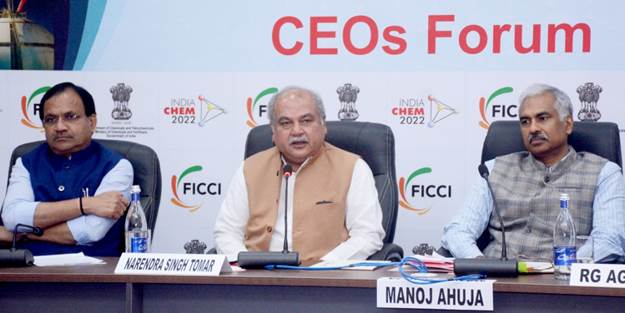Last Updated on November 4, 2022 4:42 pm by INDIAN AWAAZ
ANDALIB AKHTER

Union Minister of Agriculture & Farmers Welfare, Narendra Singh Tomar has stressed on the need for a coordinated and comprehensive efforts across various ministries and industry to realize the true potential of India, especially in the agriculture sector.
Addressing the day-2 of ‘INDIA CHEM 2022′, organized by FICCI, jointly with the Ministry of Chemicals and Fertilizers, Govt of India on Nov 3, Mr Tomar highlighted that chemicals play a very important role in our lives. In last 8 years, the government has tried to identify not just the problems but their solutions as well. The government has already abolished over 1400 laws and working to provide ease of doing business for the Indian industry, he added.
Mr Tomar stated that the image of India is changing both domestically and globally and it is imperative that we find ways to grow further. As compared to the rest of the world, post-COVID, the government has taken a series of steps to ensure that we stand strong including manufacturing of vaccine, introduction of PLI and providing booster to the economy. “Agriculture sector is a very diversified sector and is the strength for India. This is our fundamental pillar and for the nation to grow, we need to focus on the fundamental pillar (agriculture),” he added.
Mr Tomar also stressed on the need to adopt a consultative approach while drafting any policy benefiting the industry and the economy. We are working to make India a stronger nation. We invite industry to come forward to share the challenges faced. The government is committed for development of not just a few but all sectors to ensure India becomes a developed nation by the time India celebrates its 100 years of Independence, he emphasized.
Mr Bhagwanth Khuba, Minister of State for Chemicals & Fertilizers and New & Renewable Energy, Govt of India said that Indian agriculture is changing with the time and this there is a need to adopt newer technology and equipment. We need to have a balanced approach for using pesticides. The government is working in collaboration with the industry to solve the bottlenecks faced by the sector, he added.
Mr Manoj Ahuja, Secretary, Department of Agriculture & Farmers Welfare, Govt of India said that India can become a global player in agrochemicals sector and there is a potential to increase our exports by 10 times. “We have to bring ease of doing business along with regulations and create a right balance which will benefit the industry and the country,” he added. Mr Ahuja stated that India has around 2,000 argi start-ups along with medium-large scale industries and we need to provide integrated package to the farmer to resolve their issues. Our long-term vision is to make India a global player in agrochemicals sector along with increasing farmers productivity, he highlighted.
Mr Arun Baroka, Secretary (Chemicals and Petrochemicals), Ministry of Chemicals & Fertilizers, GoI said that the Indian chemicals sector is growing around 1.5 per cent more than the nation’s GDP. “Agrochemicals are very important for the economy, hence there is a need for optimum use of fertilizers for human safety and environment,” he added.
Mr RG Agarwal,Chairman, FICCI Crop Protection Committee & Group Chairman, Dhanuka Agritech said that Agrochemicals are one of the important inputs to agricultural sector in providing food, nutrition, health, wealth, and environmental security for the nation. “Agrochemicals play a major role in improving the agriculture productivity and the government has identified this sector as one of the 15 Champion industries under manufacturing sectors,” he added.
Mr Vikram Shroff, Director, UPL Ltd said that India has the opportunity to provide food for the world. India is the 2nd largest producer of the food in the world, and we have sustainable agriculture. India will see more investments in chemicals, agrochemicals sector.
Mr Simon Thorsten Wiebusch, Executive Director, Bayer Cropscience Limited & Country Division Head, Crop Science division of Bayer for India, Bangladesh, and Sri Lanka said that image building for the agriculture and the industry both within India and globally is very important. We must ensure access to newer digital including chemical and trade technologies to Indian farmers to make us globally competitiveness.
